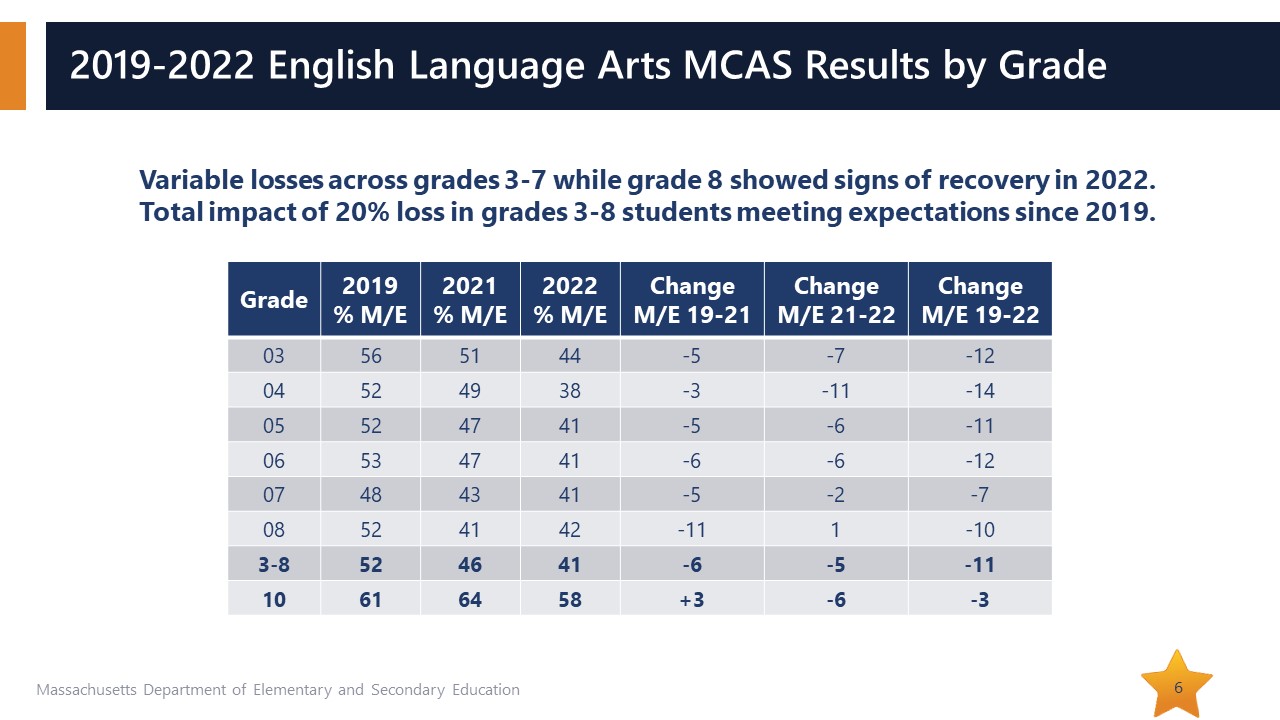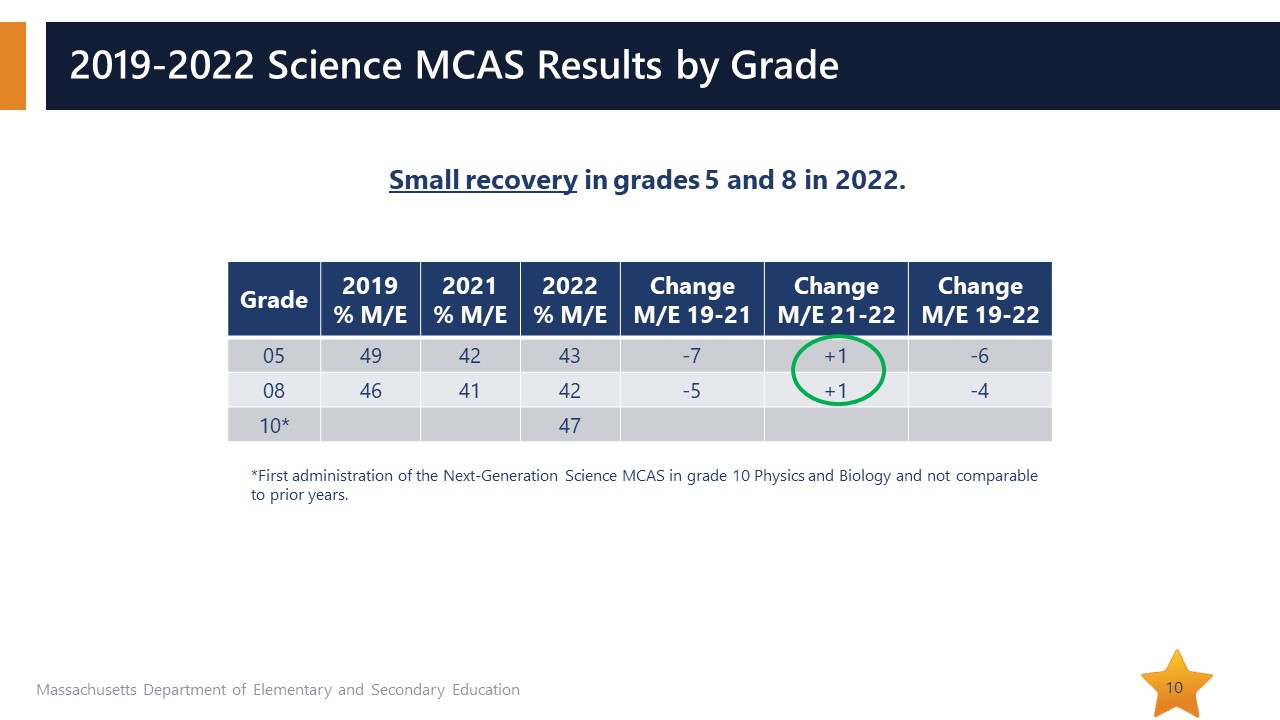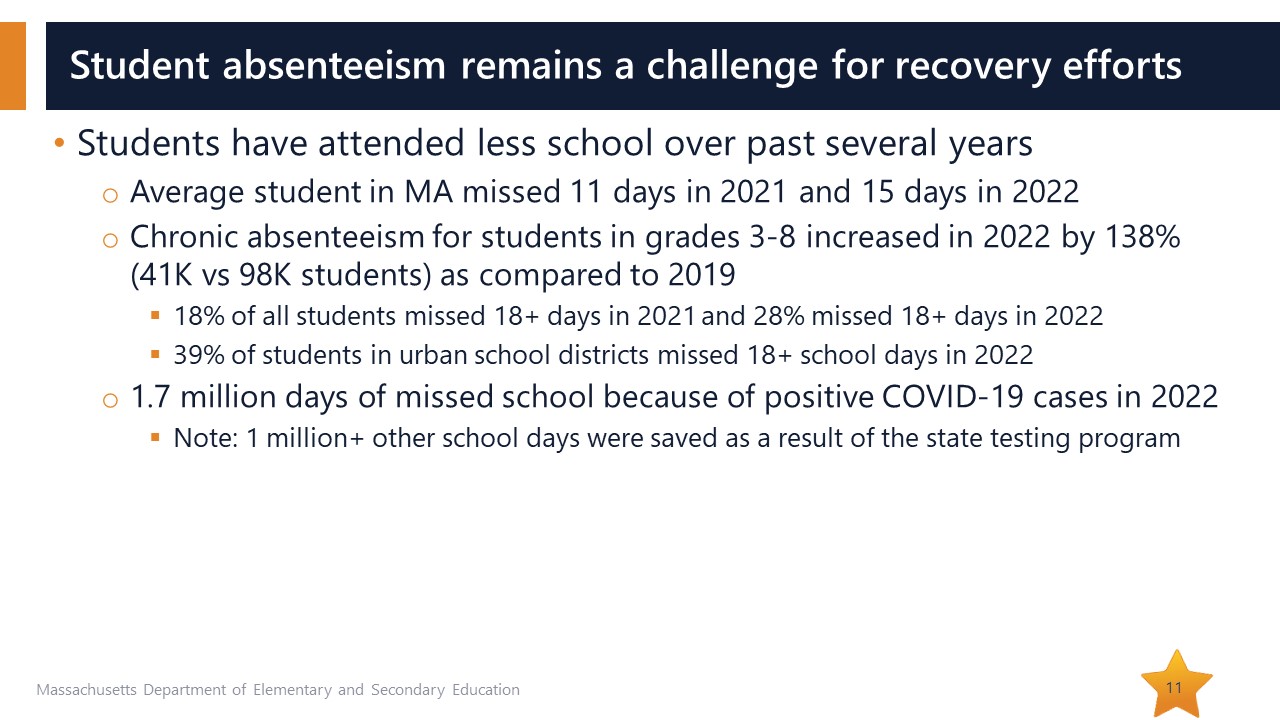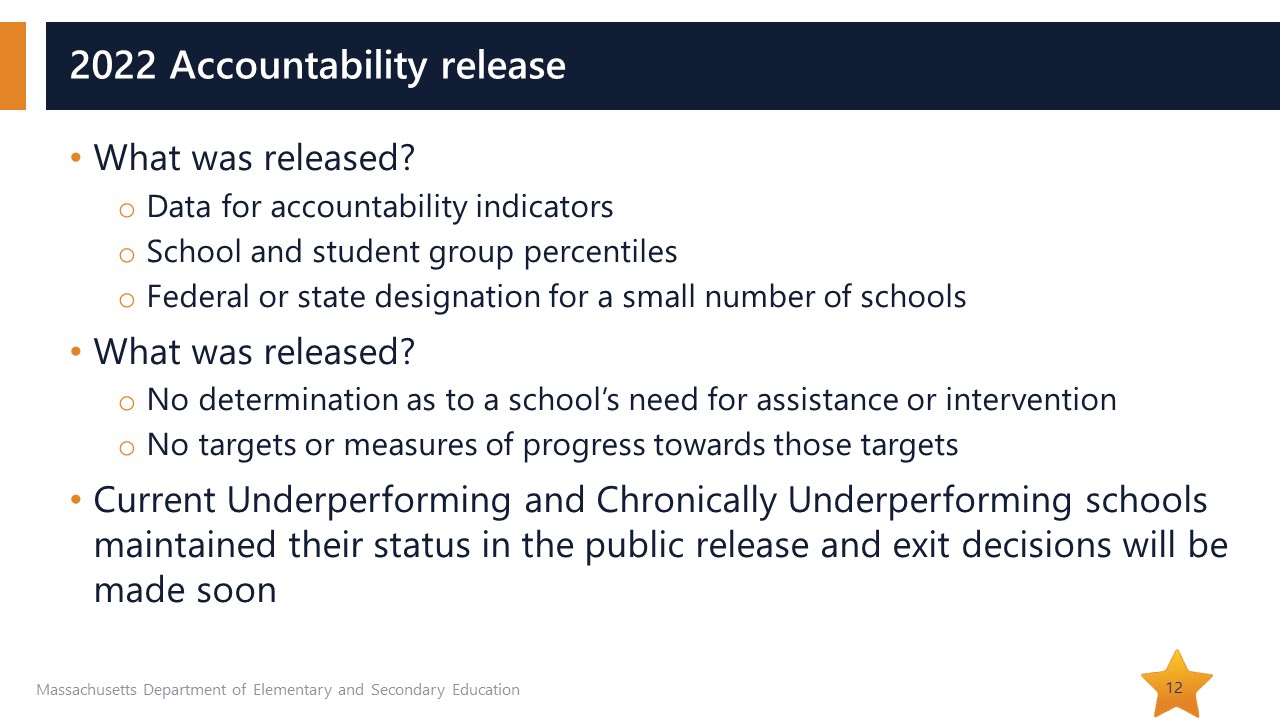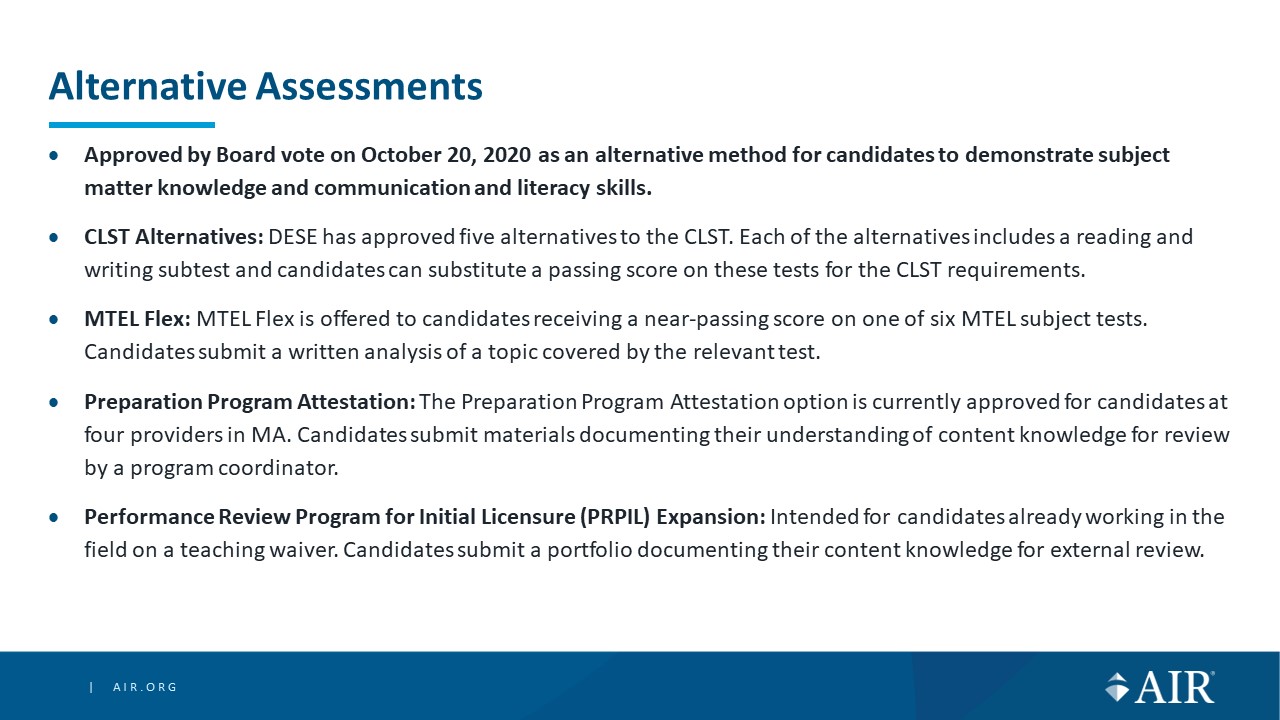
Search
October 2022: Board of Elementary and Secondary Education
- Details
- Published on Friday, 28 October 2022 16:21
The Board of Elementary and Secondary Education met on October 25, 2022 at 9 am. The agenda for the meeting can be found here; the meeting video is posted here.
The single public comment was regarding the "unleveling of high schools" and a request for additional Boston exam schools.
Chair Craven, remote due to the death of her sister, updated subcommittee appointments. Member Mohamed briefly gave an overview of the budget subcommittee's process so far. Member Moriarty spoke of plans for the upcoming early literacy subcommittee.
Secretary Peyser noted that last week was STEM week, and also called attention to a report released last week regarding higher ed enrollment, which reflects concerns regarding college readiness and matriculation. He also noted the shooting earlier this week in St. Louis, saying that we need to do everything we can to make and keep schools safe.
Commissioner Riley spoke of the Better Together School Summit, on working with families. He said that he'd spoken with Boston regarding transportation, particularly for students with special education needs. A formal complaint has been filed with DESE by parents; DESE has 60 days to issue a letter either of finding or of closure. The district is not meeting the 95% on time goal set in the state agreement.
Riley also briefly spoke of the MCAS and NAEP results shared later in the meeting, saying that while "some particularly in recent times have been against standardized testing" the data "is crucial for teachers to understand where students need additional help."
The presentation on MCAS and NAEP results can be found here and is at 29 minutes in on the video. The public release of MCAS results and accountability data was last month; NAEP results were released earlier this week.Rob Curtin, Chief Officer for Data, Assessment, and Accountability reviewed the results with the Board. He first reminded them of the changes in test administration over the past four years:
- 2019: full administration to all
- 2020: no tests administered (to anyone)
- 2021: half the test administered to 3-8; full test to grade 10
- 2022: full test to all
The 2022 results are mixed compared to 2021: math scores have increased; ELA scores declined for the second year in a row; science scores increased slightly. Compared to 2019, "we still have a ways to go" across all subject areas.
Curtin noted, "I'm not a huge fan of the terms 'loss' and 'recovery' being used, but they're certainly out there being used in the education world."
In math, the state saw recovery across all grades: about 50% of the loss in 2021 was recovered in grades 3 and 4; in grades 3-8, there was a big dip from 19-21, but a big recovery in '22. The rate of loss has slowed considerably in grade 10 between grades 3-8 and 10, same percentage point loss from 19-22 across all.
In response to a question from Member Hills regarding how much comfort can be taken from these results given the 2021 administratoin, Curtin said, ""ultimately, I think we should be looking at where are we now, and what's the long sort of result versus pre-pandemic...but it is important to note the efforts of our students and our educators in 2022 to show the increases that we did show."
Regarding gaps between groups, "there are two stories here." Achievement for African-American and Hispanic students remains low, "but it's important to note that gaps between" those groups and white students "have not increased over time." Gaps still do exist and are part of the work moving forward.
Curtin noted that there is a different story in ELA, where there are variable losses across grades 3-7; grade 8 shows signs of recovery; and in grade 10, '22 lost ground compared to '21, where there had been a slight increase.
For the 10th graders, this is the first new data on them since they were in grade 7.
In race and ethnicity, the gaps "have not changed" much.
The Department has dug into the results and two themes within the ELA results emerged: early literacy, where the loss accelerated in grades 3-5, while slowing in grades 6-8; and writing, as the average points per essay dropped in grades 3-8, with larger declines in grades 3-5.
In science, there was a small recovery in grades 5 and 8. The first administration of the new physics and biology exams is thus not comparable to other years. The new baseline is 47% of students meeting or exceeding expectations.
Curtin noted "not surprisingly" student absenteeism over the past has played a significant role. In sum:
Curtin said, "students have attended less school--I'm not breaking news in any way there." The average student in MA missed 11 days of school in '21 and 15 days in '22, thus 26 days of school over the past two years. Chronic absenteeism--missing 10% of school, thus 18 days--in grades 3-8 increased by 138% between 2022 and 2019; nearly 100K students were chronically absent last year. 18% of all students missed 18 or more days in 2021; 28% missed 18 or more days in 2022. In urban districts, nearly 40% of students were considered to be chronically absent in 2022. It is, Curtin said, "easy to see the loss of instruction due to missing school" and it "certainly helps to inform some of what we're seeing today...obviously, the main driver of this was COVID...hopefully, knock on all kinds of wood, we will not have to experience this year."
Member Moriarty said he wanted to "lean into the urgency" of these results, commenting that the 2019 results were also unacceptable. He said, " [I] think it is worth looking at the places where the majority of students are not learning to read on time...[I] believe the whole school culture is affecting when most kids are behind." He said, "over 300 schools that didn't teach kids to read in 2019 based on third grade MCAS...over 500 this time around, over 60% of our schools."
Member Stewart asked about measures of family engagement.
Regarding accountability, Curtin walked through what was and was not released this year:
NAEP scores for 4th and 8th grade reading and math were released Monday; the National Assessment of Educational Progress samples students across the country representatively. In Massachusetts, there were about 2500 students sampled per test; in total, about 7% of the grades 4 and 8 enrollment. Massachusetts was the top performing school in the 2022 administration, first or statistically tied for first in all four tests.
While Curtin noted "yesterday is a big day, with the score release; it's a researcher's dream...it's a headline writer's dream, in some ways when the results come out," he observed,"other than the relative standing of Massachusetts compared to other states...there wasn't a lot of us to learn from the NAEP results that we didn't already know from MCAS." That, he said, is "really a testament to the quality of our test."
Agreeing, Member West, a member of the National Assessment Governing Board, called it "an audit on our results." He also noted that Massachusetts, while highest performing overall, is generally not the highest performing when it comes to subgroups. Lombos asked the Commissioner about shifting programs to meet the need; Riley previewed something from his goals about visioning.
Hills asked about targets. Curtin said that it will be a challenge, as past targeting was based on improvement seen in similar districts based on historic data; the pandemic has changed the trajectory. Hills pushed for some way of calibrating success or failure. Curtin responded, "the important thing is the find the intersection of ambition and achieveability," observing that No Child Left Behind had set a rate of 100% proficiency. Hills stated that he wanted the Department to come back for a "conversation with the Board before you've locked into goals and released them." Member Canavan said "even if it's a moonshot," she hoped that goals would "rally" people to be more a part of the process. West said he was concerned that too much ambition on goals might lead all resources to go to these outcomes and not others. He said, "in some sense, the task is most urgent for the students who are high school sophomores now who are about to be through any stage they're contributing to MCAS scores...we don't want schools and districts to be ignoring their needs; to some extent, we want them to be prioritizing their needs." Moriarty said he appreciated the absenteeism data, saying, "clearly we have a lot of families and students who have been disengaged from school in a greater way than we have ever seen before. None of this tells us how to re-engage."
Commissioner Riley introduced his goals by observing that, while the traditional role of the Department was that of compliance, he has argued that the Department needs to be more supportive of districts. The four themes of his goals and the presentation:
Provide Supports to Accelerate Student Learning
He said, "this is shifting away somewhat from that compliance role."
The focus is on early literacy, acceleration academies, deeper learning, early college, IEPs and English learners.
Build a Diverse and Culturally Responsive Workforce
He said this was "research proven to be effective for children."
Cultivate Safe and Healthy Learning Environments
He specifically noted mental health, as "students came back from the pandemic often disregulated, often with challenges," but that includes mental health, food, housing.
Align DESE Supports to a Shared Academic Vision of Deeper Learning
Explaining that staff are working on "visioning," he said this would be "a vision for where we're going with this Department."
Secretary Peyser mentioned early college and vocational education. Member Stewart asked about family engagement. West asked about the competency determination process, and the need for support on that. Lombos asked after what is most impactful for students of color. To that, Riley replied, they focus on data for all students to "see what is most impactful," adding "prior to five years ago, we didn't understand that there was a relationship between teachers of color and student performance and we're probably the only state that's focusing on this right now."
Canavan asked "what levels" could the Board "push or pull" with the greatest results. The Commissioner spoke of chronic absenteeism. Hills said he liked the comprehensive nature of the goals.
CFO Bill Bell said the Department is putting together a "maintenance budget," which is a level service budget that will be shared with the new administration for their preparation of the FY24 budget; the new governor has until March to file their first budget. He said that ESSER I has been fully drawn. Hills asked about the difference between "drawn" and "allocated." Bell noted that all of ESSER, including ESSER III, has been allocated for some time; he said, "When I say 'drawn,' I mean they have recorded expenditures at the municipal level which entitles them to draw their reimbursement from the state; it's a reimbursement based model."
The Board also heard an update on the alternatives to MTEL being piloted at this time. They are:
The presentation fron the National Center for the Analysis of Longitudinal Data in Education Research focused on the first two, as thsoe have been most thoroughly implemented at this time. Those taking advantage of these options are disproportionally on emergency licenses who are already working in the field. Looking ahead, the plan is to link those being certified this way to their career milestone data. The proposed extension of the pilot will allow for additional data gathering to better inform certification. The Board asked in several ways about how the "rigor" of the assessment was ensured--it is aligned with objectives, and that review is done prior to use of the assessment to ensure only those are used. There was also some discussion as to theories of why different assessments might be yielding different results by subgroup.
The Board then was asked to send for public comment proposed amendments to the regulations on licensure. In addition to an extension of the above pilot, this also includes a proposed provisional license for assistant principals and principals (to allow for those pursuing such licensure to complete the performance tasks required while doing the job); to provide for out-of-state SEI endorsement; and to add, as now required by law, a military spouse certification. There are also other minor revisions to ensure alignment in terminology and language.
The Board voted to send the proposed regulations out for public comment through January; they will report back to the Board in February.
The Board also voted to adopt the revision to bullying regulations, as discussed last month.


